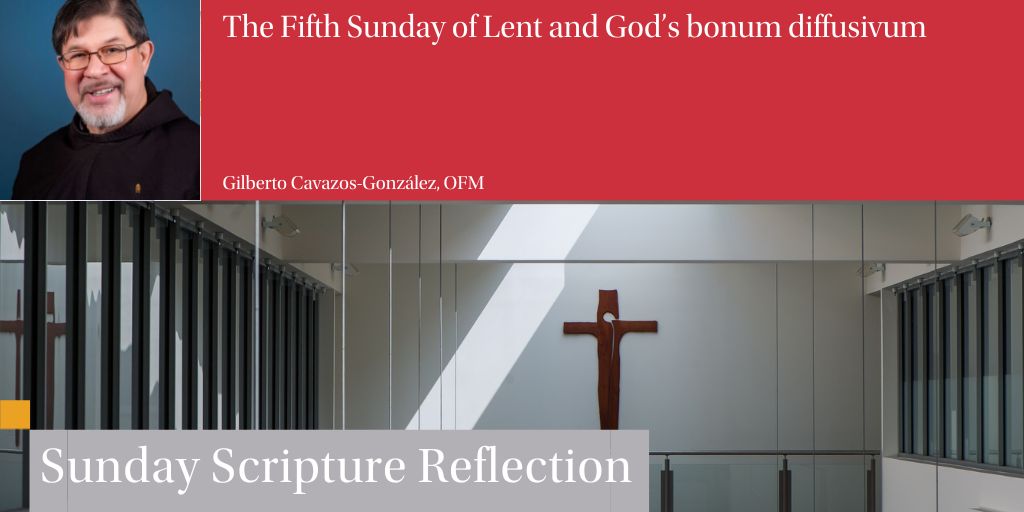
Readings:
Isaiah 43:16-21
Psalm 126:1-2, 2-3, 4-5, 6.
Philippians 3:8-14
John 8:1-11
Last Sunday was Laetare Sunday, calling for mid-Lent rejoicing even during penance. Its name comes from Isaiah 66:10-11: “Rejoice with Jerusalem and be glad, all who love her; exult with her, all who mourn over her!”
This Sunday, the fifth Sunday of Lent, continues to invite the faithful to rejoice, as the Lord has done great things for us, filling us with joy. Lent, traditionally a period of penance and mortification, is fundamentally a time for conversion. This conversion entails considering all things as rubbish to gain Christ and be found in Him (Philippians 3:8). Our Lenten practices of prayer, fasting, and almsgiving are ways of striving towards the goal of God’s upward calling in Christ Jesus (Philippians 3:13-14).
These practices of ongoing conversion strengthen our resolve to turn away from sin and death, facing God who makes all things new (Isaiah 43:19, Revelation 21:5, Lamentations 3:22-23, Romans 6:4). The concept of “all things new” is intended to put a smile on our face, a skip in our step and delight to our hearts, reflecting the overflowing goodness of God. In Catholic theology and tradition, God is the bonum diffusivum, a goodness that cannot be contained and spills over into creation. This goodness invites us to share it with others; to spread it around.
In today’s Gospel, the bonum diffusivum is exemplified in the profound message of God’s boundless mercy and forgiveness, as illustrated in the story of the adulterous woman. This Gospel reading challenges us to examine our hearts, recognize our own need for mercy, and extend that same mercy to others. Psalm 34:9 invites us to “taste and see the goodness of the Lord.” Tasting and seeing remind me of the Korean concept of “noonchi,” which was explained to me as listening with our eyes, responding to life with an awareness that comes from using all our senses. Psalm 34 invites us to do with our mouths what we usually do with our eyes. In this way, we are encouraged to use our whole selves to encounter God and be aware of His overwhelming and bountiful mercy.
Once we have wholeheartedly encountered and tasted the goodness of the Lord, our mouths will be filled with laughter and our tongues with rejoicing (Psalm 126:2)6. In this way, we can be joyful ambassadors for Christ (2 Corinthians 5:20). Saint Paul reminds all the baptized that God has reconciled us to Himself through Christ and given us the ministry of reconciliation (2 Corinthians 5:18). All the baptized, not just the ordained, have the duty and responsibility of distributing God’s bountiful and overflowing goodness through the generous gift of mercy. Every time you forgive those who wrong you or hurt you, you are cooperating with the bonum diffusivum; you are sharing God’s mercy. Every act of reconciliation you undertake helps others experience and see the goodness of the Lord. Throughout your life, you have many opportunities to share the goodness and mercy of God.
Jesus’ own life was filled with opportunities to spread God’s goodness. Healing the sick, making the deaf hear, inviting the lame to walk, and cleansing the lepers was his way of sharing the bonum diffusivum that spilled over from God’s generous mercy. The mercy and goodness of the Lord extend beyond physical healing to our moral lives, forgiving our sins, reconciling us to God and to one another, and strengthening our virtues and talents.
According to the Gospel of John (8:1-11), Jesus extended God’s goodness to the adulterous woman as well as the scribes and Pharisees. Faced with a trap designed to ensnare Him, Jesus extended mercy to the scribes and Pharisees, causing them to confront their sinfulness. Instead of falling into their trap, Jesus responds with wisdom and compassion. He writes on the ground with his finger—possibly listing the sins of the accusers or questioning the absence of the adulterous man, as both were subject to punishment. He then declares, “Let the one who is without sin be the first to throw a stone” (John 8:11). One by one, the accusers leave, realizing their guilt.
Jesus then extended mercy to the woman, refusing to condemn her and instructing her to sin no more. God’s unconditional love and goodness extended themselves to this woman in Jesus’s act of mercy and reconciliation. Jesus’s interaction with the woman was not a judgment but a meeting between a sinner and her Savior. In her fear, he saw a desire to be understood, forgiven, and set free through a visible sign of the Father’s love.
Pope Francisco, in Misericordia et misera (2016), reminds us that forgiveness is the most visible sign of the Father’s love, which Jesus sought to reveal through His entire life. We are called to taste and see the goodness of the Lord’s mercy, which transforms and changes our lives. Like the woman in John’s Gospel, we are all beneficiaries of the bonum diffusivum, hearing the words “Neither do I condemn you. Go and sin no more” (John 8:11). In this way, we receive God’s goodness and continue our Lenten practices, striving towards God’s upward calling in Christ Jesus (Philippians 3:13-14)14. As Lent moves towards Holy Week, let us strive to become ambassadors of Christ’s reconciliation and of God’s bonum diffusivum.
Gilberto Cavazos-González, OFM
